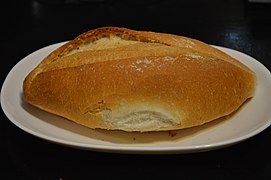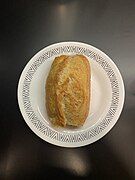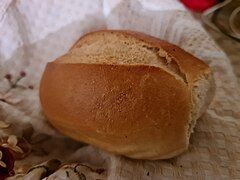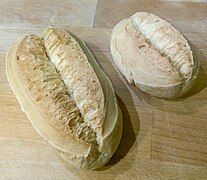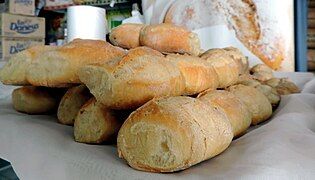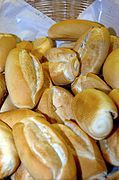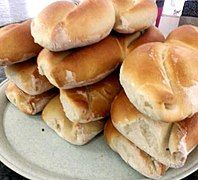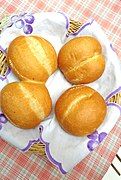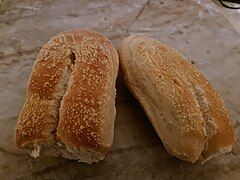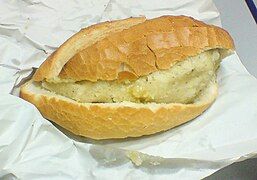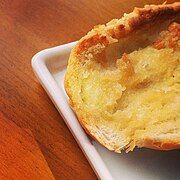French roll
The topic of this article may not meet Wikipedia's general notability guideline. (October 2023) |

French roll refers to various baguette-like bread rolls in different regions around the world.
French rolls around the world
[edit]Asia
[edit]Hong Kong and Macau
[edit]In Hong Kong and Macau, dyun faat baau (短法包, literally "short French bread" or "short baguette"), also known as the zyu zai baau (豬仔包, "piggy bun"), is used to make pork chop buns.[1]
Europe
[edit]Spain
[edit]On the Spanish island of Mallorca, the llonguet is also known as panet francès, meaning "small French bread" or "French bread roll" in Catalan.
Portugal
[edit]Carcaça and papo-seco are two traditional Portuguese breads.[citation needed]
Latin America
[edit]Across Latin America, the terms pan francés (Spanish) or pão francês (Portuguese), both meaning "French bread", refer to various baguette-like bread rolls made with wheat flour, salt, water and yeast.
Argentina, Paraguay, and Uruguay
[edit]In Argentina, Paraguay, and Uruguay, pan felipe (Felipe bread) is a commonly eaten French bread roll.
In Uruguay, there's a denser version known as pan marsellés (Marseilles bread). The Marseille bread called pan marsellés in Uruguay is different from the Brazilian pão francês. The Brazilian type is less dense and lighter and crispier. However the Uruguayan version is made with a denser bread dough resulting in a harder bread (similar to Italian bread), with the crust covered in maize flour before baking.
Bolivia, Chile, and Peru
[edit]In Bolivia and Chile, the beloved marraqueta is sometimes called pan francés. In Peru, the term pan francés (or sometimes called pan francés peruano) is different from the marraqueta.[2]
Brazil
[edit]The most popular bread in Brazil is the light and crispy pão francês. Pão francês is known by several names throughout Brazil, such as cacetinho, pãozinho (little bread), pão de trigo (wheat bread), pão de sal (salt bread), pão de água (water bread), pão aguado (watery bread), careca, and pão Jacó (Jacó bread). It is commonly found in delis and bakeries throughout Brazil.[3][4]
Mexico and Central America
[edit]In the region of Comarca Lagunera in northeastern Mexico, pan francés (or sometimes called pan francés lagunero) is an important part of daily dining.[5]
In other parts of Mexico and Central America, the word pan francés is used to refer to bolillo.
Gallery
[edit]-
A bolillo (Mexico)
-
A marraqueta (Chile)
-
A marraqueta paceña (Bolivia)
-
A pan felipe (Uruguay)
-
Llonguets (Mallorca)
-
Marraquetas tacneñas (Peru)
-
Pães franceses (Brazil)
-
Panes franceses (Mexico)
-
Panes franceses (Peru)
-
Panes marselleses (Uruguay)
-
Piggy buns (Hong Kong)
See also
[edit]References
[edit]- ^ Williams, Vicki (12 July 2017). "10 foods you can't miss in Macau". CNN. Retrieved 17 October 2023.
- ^ Nolasco, Por Edwin Montesinos (16 October 2023). "El pan que le ha quitado protagonismo al 'clásico' francés y cuáles son los nuevos productos con granos andinos". infobae (in European Spanish). Retrieved 17 October 2023.
- ^ "A história de como o pão francês virou o favorito dos brasileiros". Revista Galileu (in Brazilian Portuguese). 2022-08-29. Retrieved 2023-10-26.
- ^ "Dia do pão francês: saiba curiosidades da iguaria que nasceu no Brasil no século 20". G1 (in Brazilian Portuguese). 2023-03-21. Retrieved 2023-10-26.
- ^ Telediario, Editorial (6 September 2020). "¡De La Laguna para el mundo! Aquí puedes encontrar pan francés en Durango". Telediario México (in Mexican Spanish). Retrieved 17 October 2023.

